Calculadoras Calculator blog Mensajes sobre el tema: HP 15c LE
Calculator blog
Musings and comments about our common interest
latest HP15c LE vs. HP41CL
I have been using the HP15c (did I tell you that I have one for sale?) during this last two days, after some time of being using the HP41CL. In general terms, I prefer the latter, due to a better keyboard, a more informative screen and a more comfortable viewing when on a table.
However, when you’re traveling, the HP41cl is heavy, you need to pack it in your suitcase, and you risk having it damaged.
Instead, the HP15c can be carried in your jacket pocket, and you can use it in the airplane without resorting to your suitcase. I have to fly a lot lately, and i can use it this way. Incidentally, this can be done with the HP42s too - it is just that I prefer the “landscape” orientation for using the calculator with a single hand (typical when you’re sitting in a low cost airplane seat!) Apart from that, I got used to the better screen contrast of both the HP41cl and the HP15c, and then, reading the HP42s with bad light conditions and a worsening sight is tiresome.
But next week, I am returning to the HP41CL! I will investigate modules with statistical distributions.
I have lost my HP 15c LE !
I have Lost my HP15cL!!
This week I was traveling on a business trip to Norway. Many nice things - but somehow I managed to lose my trusty HP15c LE. It belonged to the initial American shipment, with serial number 182. The ones I have been selling were in the 23k range already.
Now, although I carry the HP15c in my jacket pocket all the time, it is with the HP41CL how I perform most of my financial work. But I had the HP15C LE programmed with all kind of financial programs (you can see previous installments of this blog to see a description of these programs. I have developed a version for the HP41CL for those that happen not to be in one of the zillion modules it comes with.)
The good thing is that I kept 5 units more in reserve. My thought was: “one for me, two for each of my two children”. Maybe they will be more attracted to the new HP Prime… In any case, I will have to spend significant time in writing all the programs back into the machine. But it is worth it: in board meetings, we can compare return rates for projects immediately - much shorter than the time it takes to open excel and test some hypothesis. And there is no way you can come into the boardroom with the whole HP41CL shebang, showing yourself a little bit as a luddite. (if only they knew that they are looking at the best current scientific calculator available…)
I have some hints about where I may have lost it. I will try to find out tomorrow, but the chances are slim...
Fortunately I did not lose my original HP15c, which has the exact same programs in.
On the other hand, I will have the guilty pleasure of opening again a new calculator - even though I did it already in the past.
I have lost my HP 15c LE !
I have Lost my HP15cL!!
This week I was traveling on a business trip to Norway. Many nice things - but somehow I managed to lose my trusty HP15c LE. It belonged to the initial American shipment, with serial number 182. The ones I have been selling were in the 23k range already.
Now, although I carry the HP15c in my jacket pocket all the time, it is with the HP41CL how I perform most of my financial work. But I had the HP15C LE programmed with all kind of financial programs (you can see previous installments of this blog to see a description of these programs. I have developed a version for the HP41CL for those that happen not to be in one of the zillion modules it comes with.)
The good thing is that I kept 5 units more in reserve. My thought was: “one for me, two for each of my two children”. Maybe they will be more attracted to the new HP Prime… In any case, I will have to spend significant time in writing all the programs back into the machine. But it is worth it: in board meetings, we can compare return rates for projects immediately - much shorter than the time it takes to open excel and test some hypothesis. And there is no way you can come into the boardroom with the whole HP41CL shebang, showing yourself a little bit as a luddite. (if only they knew that they are looking at the best current scientific calculator available…)
I have some hints about where I may have lost it. I will try to find out tomorrow, but the chances are slim...
Fortunately I did not lose my original HP15c, which has the exact same programs in.
On the other hand, I will have the guilty pleasure of opening again a new calculator - even though I did it already in the past.
The HP48SX
I have now besides me a mint unit. No box, slightly used pouch, but absolutely mint body, screen and keyboard. As you can imagine, I have a quite good supply of HP calculators, and I have to say that the initial models of the HP48 family were probably the most beautiful, highest quality calculators HP ever did. Later green-based models were not as beautiful for my taste (plain ugly, I would say), and keyboard quality would be worse in some later models (I would say the latest G/GX versions, not the prior ones)
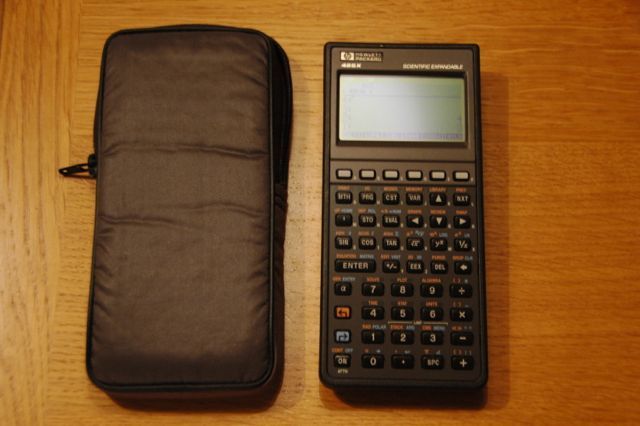
I don't know why HP departed from the brown color of this 48SX. The orange, white and blue colors of the additional key functions are very readable (less so the blue than the others, but still very much), and the matt tone of the background makes a pleasure to work with this calculator on the heave light of many offices or classes.
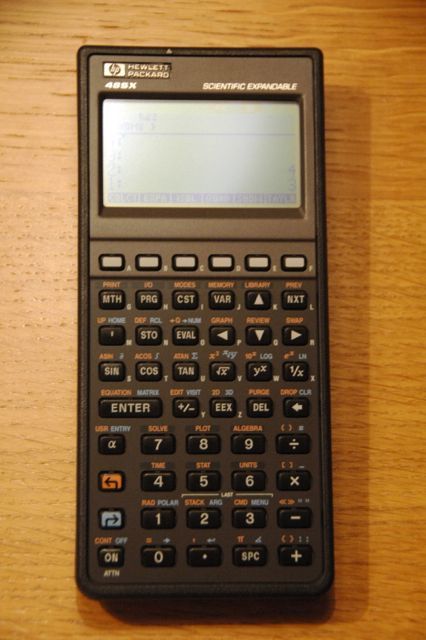
The only bad point compared with what HP is capable is the screen. The blue color LDC is much more difficult to read than the current LDC screens of the HP50g or the newest HP39GII. Now it seems uncomfortable - but I have the same sensation when I start working again with the acknowledged top of RPN calculators - the mighty HP42s. Contrast in that screen is minimal, when compared with the newer HP17bII or the old HP15c. Nevertheless it remains the calculator of choice for many things, since it fits perfectly in the jacket pocket.
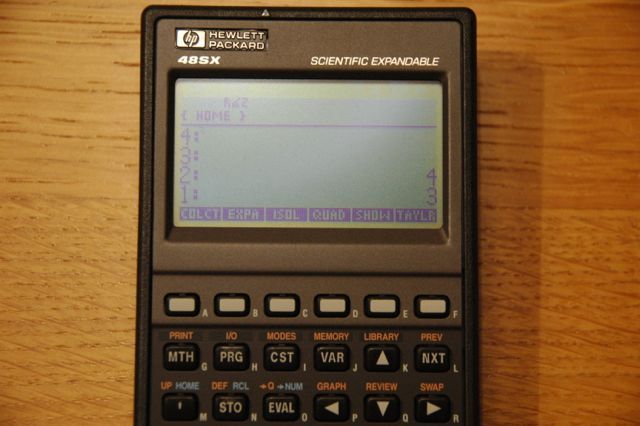
The keyboard in the HP48SX has the same feel of the Pioneer family. It is one of the best HP has produced, but still after the HP41c family, which for many were the best keyboards HP produced. (While it may seem blasphemy, I think that the keyboard feel of the current silver HP17bII+ is excellent, and it is my every day office calculator. As it is thicker both in body and in its pouch than the Pioneer series, it does not fit comfortably in a jacket pocket - I carry there a new HP15c LE)

I see that today I am diverting too much from the original aim of today's blog: the HP48SX. Coming back to what I was elaborating: The keyboard visibility is higher than today's graphical models, with the exception of the HP50g Blue; the keyboard organization seems better to me; the color scheme is unsurpassed to date, in the HP48 series or in any other series, for that matter, save for the voyager series; and the keyboard feel remains among the best.
It is just that it does not make sense to me to get accustomed to a 20-years old system that has been superseded by more modern and complete models like the HP50g. If it was instead RPN, I could live with that; I have hard time to make more than very basic programs in RPL; my mind is wired in either basic-like languages or RPN; but RPL, despite being very close to RPN, is substantially more complex to follow than RPN. YMMV, of course.
Please take a look to the article of Mr. Wickes, one of the creators of the RPL concept. It is in the HP journal of June, 1991. You can find it in the url below:
http://www.hpl.hp.com/hpjournal/pdfs/IssuePDFs/1991-06.pdf
(By the way, there are many articles worth looking at in this journal series. It is a testimony of the HP quality of that time, that resources were allocated to create interesting, well documented and produced company newspapers like that.
To find a list of articles in the series, in order to look for a particular subject, go to this link:
http://www.hpl.hp.com/hpjournal/pdfs/HPJ_catalog.xls
All the Journals were digitized from 2006 onwards)
New HP15c LE batch arrived
Yesterday I received the last batch of HP15c Limited Edition. The several boxes of 10 units that I have received have packing dates from 12.4.2012 to 13.4.2012 (European date convention!!). All of them have the initial firmware, i.e. 15.4.2011. This means that in this last release, you will see the same couple of quirks that have affected all units so far.
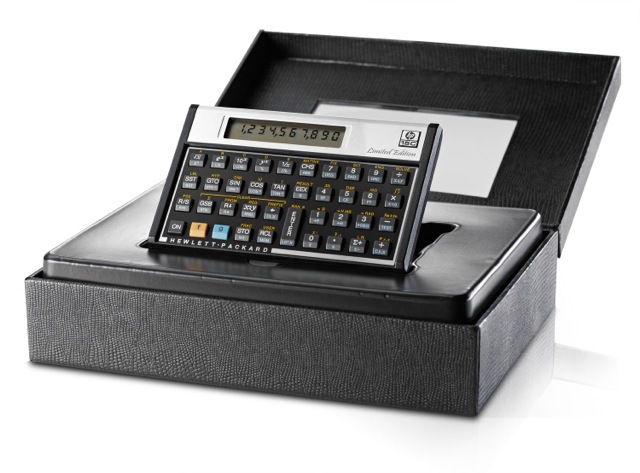
Quality of keyboard seems, if anything, to have improved over my first unit. And now, when talking about "HP15c Limited Edition", you need to know that the unit I took out of the box had a serial number over 23.000 !! You can imagine that the total production might have been 25.000 units - and that's already a significant percentage of what the original 15c was! (We've been told that over 100.000 units were sold during its original production time - probably up to 150.000 if we count all origins). While 25.000 is a small number when compared with the millions of typical smartphone products, it is already a significant number for a premium calculator.
I hope that someone sees that there are tools that are just "good enough", and don't need to be changed every couple of years for the next best thing. The HP15c is one of them, and deserves to be a part of the HP calculator line, not as a Limited Edition but on its own right.
By the way, many think that the HP42s deserves similar position - but its reissue is much more unlikely, given the development means available and the size of the assignment - unless they take the work of significant members of our community to go faster. For now, let's rejoice in our luck and enjoy the HP15c LE. We do not know if we're going to have it for a long time. I will stop sales when I have just 10 left - and that'll be enough for myself and my children.
Remembering the recent past on HP calculators
More that a year has elapsed since we opened this website. Of course, I have not been linked to this area all my life, so my point of view for what follows may be limited; but the amount of news during this last year is amazing!
From HP itself, we have seen the HP12c Anniversary version; the HP 15c Limited Edition; and the HP39gII (first in China, soon to be released in Europe as well).
From our community, we have the WP 34s in its two flavours (2.2 and 3.0), and the DM15cc
HP 15c LE last production run.
It was beautiful while it lasted…
Several distributors have confirmed us that the last run of HP 15c has already been distributed, and that HP does not plan to produce more.
While it has been a fantastic premium product, we have to realize that this is a niche product, and, in the grand scheme of things, completely irrelevant for HP. Any of the other products made by HP is produced in quantities 1 or 2 orders of magnitude greater than our beloved HP 15c; some of them, even three orders of magnitude!
I know that some of you saw this coming, and ordered more than one unit. There were some that ordered as many as 10 (I guess that there was some ebay reselling involved) but several ordered 5 units.
Now is the time to take a decision that may last for the rest of your life…Seriously now, while if I were HP I would keep the 15c running for as long as it sells, the production logics for this kind of product implies that it may well be the last time that this model is produced.
I guess that we did not behave well, as a community, with respect to the HP development team regarding this product. As this community has been asking repeatedly for this product, the development team set to produce it, based on an already developed body – the one of the HP 12c; but it seemed to me a labour of love, because the potential market did not deserve any development time or effort for such a small niche.
Once this product had been released, as a gift for us all, there was a lot of criticism on the grounds of supposed low quality. I have and use an American unit of the first batch, and another of the European batch, and both worked flawlessly. Of the more than 500 units sold by us, only three units have been defective. There were criticisms as well about the keyboard, but anyone with experience with the current HP line would attest that it is the best keyboard in production with the sole competition coming from the HP35s and HP17bII. And compared with the original…well, in my 1985 unit, the keys are softer and shiny, but not necessarily better.

The presentation of the product was as well ahead of any other product - either HP's or the competition's (the anniversary 12c had a smaller box and no printed full manual. The only missing item in the HP15c for a completist would have been the Advanced Functions handbook, itself a masterwork in itself.)
As for the bugs…well, there really was only a bug, which had never been a problem for me (since I did not use PSE but R/S in general in my programs).
However, I found so much bad karma on the comments that, if I were a member of the development team, I would know where to put our community demands…
Why using a handheld calculator nowadays - part II
The Smartphone as an alternative to the calculator
If you have a smartphone, then you already have a calculator - or should I say, all calculators. Due to my job, I use a Blackberry, and the "app ecosystem" is not as rich as that of the iPhone/Ipad. I know that there are a couple of emulators for HP12c, but what's the point of loading one in such small screen, when I have several units of the original machine? But if you have and iPhone, then there is a very wide choice for you - free and payable.
The advantages of a smartphone as a calculator are several:
▪ You can have many calculators - you are not limited to one. There are emulators for practically all the calculators we love. And these are not exclusive: you can have as many as you want in your phone. In fact, calculator apps are not specially big: take into account that most of the original calculators were fitting their logic into 4 kbytes ROMs, or 8 in the case of HP15c, or even 48 kbytes in the case of the HP85a). There are not fancy graphics or memory-consuming animations.
▪ You can have the calculator with all the options - not just 4 modules to choose. There are examples of HP41c smartphone applications, that are running an emulation of the nut processor and can load any of the hundreds of modules developed for that machine; or you can have much more memory than the original; or you can have an extended character set, or more legible number fonts.
▪ The calculator is a couple of orders of magnitude faster than any of the originals, and sometimes faster than even the new models.
▪ You can even carry the manual with you - if you are able to read a pdf in such a small display!
▪ When you hear the click of the key, then it has registered. It won’t happen what we’re seeing more and more in new calculators: tactile positive feedback, and key not registered.
▪ Sometimes we forget this one: you don't need to carry an additional machine, and you’re taking the smartphone with you anyway!
▪ You can upload programs – something your calculator most likely can’t.
However, there are as well some disadvantages:
▪ You can't calculate when you are making a phone call - a situation that, if you look at it, is happening all the time. By extension, you can’t see a contact, you can’t connect to the internet, etc., when you’re calling (unless you’re using a Bluetooth headset, a reader pointed to me ;-), but even in that case, it is cumbersome to navigate the apps while you’re talking)
▪ Usually the screen is much smaller than that of the original calculator. This makes keying in cumbersome, and a high wrong key rate.
▪ Depending on the models, the graphical interface is not fast enough to keep you “connected” to the machine, even though your programs run at breakneck pace;
▪ At a test,
▪ You are not allowed to have a switched-on phone (or a device that can handle the whole library, or access to internet, or…)
▪ You want a dependable calculation device: you don’t want it to run out of batteries during the examination!
In a way, it is a little bit like using your Iphone as a sound meter – it works, and it works well; but if you’re a professional, you want something specific – and better, for sound measurement.
At the end, the user has the right answers for himself. Myself, I lived a couple of years without calculator when my HP17bII died – and I survived in business without.
Why using a handheld calculator nowadays - part I
Many people, when they see me using a calculator in my job, argue about why using now a calculator, when there are so much more powerful alternatives. They always try to convince me about how much better is a spreadsheet, etc.
Let me try to organize my thoughts about what's the point of having a calculator nowadays, when we have computers and, let's not forget, smartphones. If you are reading this, chances are you are as nut about calculators as myself, and you are as well faced with those questions from time to time. I hope then I can give you some elements for discussion. I would like to ask you to post your own reflections, to reinforce my arguments as well.
(Other times I get challenged about collecting calculators, but for that, to be honest, I haven’t found any good argument in our defense!!)
Alternatives
In order to systematize the discussion, let’s see first which are the most likely alternatives to your calculator (the most likely, not all of them. Remember the HP-01? Or more typically, the Casio watch calculators?)
- PC running spreadsheets
- PC running specialized mathematical software (Vgr. Mathematica)
- PC running a calculator program
- The operating system’s own calculator
- Emulated “true” calculators
- Smartphones
- Own calculator
- Calculator Apps
- Ipads and other tablets
In this post I will deal with the first ones, leaving the others for a further post
PC running spreadsheets
On one side, it is true that an spreadsheet carries you further and with less effort - and it leaves a trace of what you are doing. You don’t need to write with your pencil the intermediate results.
Today spreadsheets have very powerful instruction sets. And it is very likely that what I now think that can't be done with spreadsheets, is more due to my lack of knowledge of the tool than actual lack of that feature. I am now thinking of all matrices-related things.
PC running a mathematical software (like Mathematica)
I have to be honest with you – the last time I used one of these, I was still using MSDOS, when I was studying engineering in the 80’s. For me, this option is limited to Academia – which is the environment that would buy and maintain this kind of software. I have to confess that my opinions on this area are based on very out-dated information, and I cannot add value. (here is where you, reader, can join in!)
Before the IBM PC was born, there was a Personal Computer produced by HP – the HP85. It was a fantastic machine, running a BASIC-oriented operating system, with a big number of mathematical operations for the time, and that could be programmed for any kind of mathematical challenge. In this case, some of you could tell me that it was not an alternative to calculators: it was, in fact, a calculator (its CPU was based on calculator CPUs, at a time where 6502, 8080 and Z80 microprocessors were common on other machines)
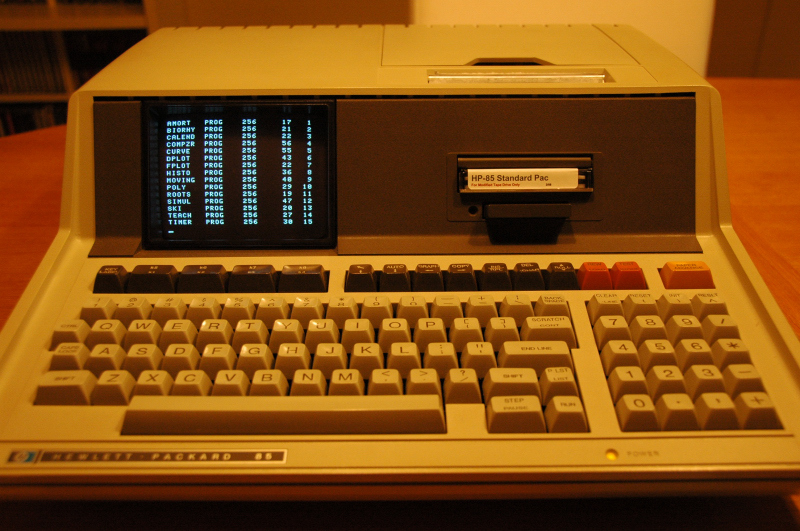
There were ROMs that enhanced its capabilities in areas that are the realm of calculators: matrices, etc.
PC running a calculator program
I am running in my Mac a couple of different HP15c, a HP42s, a HP41cx, and under the Windows screen in parallels, a HP50g. Even the most advanced scientific calculator (the wp34s), started its life based on the SDK of the 20b - if I am not mistaken. I have written a blog article for the humble Mac OSX calculator, that can be configured as RPN as well.
The choice would be even bigger, were I running Windows as main machine. I have not explored the options for Linux. I might be interested if I still was in the Windows camp, but I moved to Mac and I’m not thinking about changing again.

The discussion of the many working alternatives for calculator programs is well beyond the scope of a single post, and deserves an article or a series of articles from somebody much more knowledgeable than yours truly. Let’s focus instead on the advantages and disadvantages:
- Advantages:
- Speed: several orders of magnitude running programs, except in case of the latest calcs, like the wp 34s, hp 50g and hp 30b
- You can have all the options – you are not limited by memory or bays used, like in the HP 41c family, or the HP71b
- In most of them, the numeric keyboard works as well, as most of the basic operations. The keyboard shift works as F.
- In some of them, there are side windows that can show the status of the internal registers, from seeing the whole stack and last x registers (good), to seeing all the CPU registers and flags (geeky).
- You can take all your calculators with you, instead of being limited to 2 or three. (I seldom travel with 2 calculators – most likely I take 3 with me: the hp 15c in my jacket pocket, the HP17bII for calculating at work, and either the hp 50g or wp 34s for fun at the hotel.
- Disadvantages:
- You need to switch on your computer, and then you need to look for the application and switch it on as well. This takes 1 minute – unless you’re working with Mac – then you’re going after 16 seconds. Let’s see what Windows 8 brings to the table.
- In many cases, the calculator does not keep the state you left previously: stack and memories. This is not really a problem of the idea but of the implementation.
- There is no comparison between keying in in a physical keyboard and doing it with a mouse.
- It occupies real estate on your screen, the same as a calculator occupies real estate on your desk – however, screen estate feels always smaller and cramped than your own desk. (by the way, this is the reason that my HP19bII never takes a lot of use – same as with the HP71b.
- If you are using it in conjunction with Excel or other program, the switch from one to the other is never instantaneous – you need to click twice on the window – once to select it, another to start doing what you wanted. This happens between any two windows applications, by the way.
There are times when you can’t use a computer – meetings!
There are two kind of meetings in my company: with and without computers. When you see a meeting where everyone is using a computer, you can assert than more than 50% of the attendees are not really there, but emailing or finishing their presentations for their turn. Therefore, they are not listening to what whoever is speaking has to say.
More and more, some managers are insisting that laptops are closed while the meeting takes place – at least, while they are speaking! Therefore, the calculator is your only alternative to number crunching during a meeting.
As well, in a meeting you need to give a fast answer, and this would be difficult with a computer. With a calculator you can do fast and dirty calculations; with a computer, you lose and inordinate amount of time formatting even the most minute calculation. There is a brain switch that allows you to take approximations and shortcuts with a calculator, but impedes all but a perfect mathematical model when you try to do the same thing with Excel!
As conclusion of part one: it is not clear at all that a computer can take all the work a calculator does. Let’s see in part two what happens with the other devices mentioned at the beginning of the article.
The DM-15cc HP15c clone arrived
As a calculator enthusiast, I could not avoid buying the new kid on the block: the smallish DM-15cc from www.rpn-calc.ch
At the very low price of 50 CHF, it is a luxuty one can afford. I bought two units - one to keep original and another to experiment with.
It is based on the original HP15c firmware, running on a nut processor emulation on a LPC1114 ARM processor. The unit chosen should give a decent battery life - let's see. (Not that I am unhappy in any way with the HP15c Limited Edition battery life - after 6 months of heavy use (but not running long programs) it is still using the inital battery set)
The unit is really minimal: see pictures comparing it with the original 15c and the new Limited Edition. I can imagine that it is too small for some fingers, but not for mine.
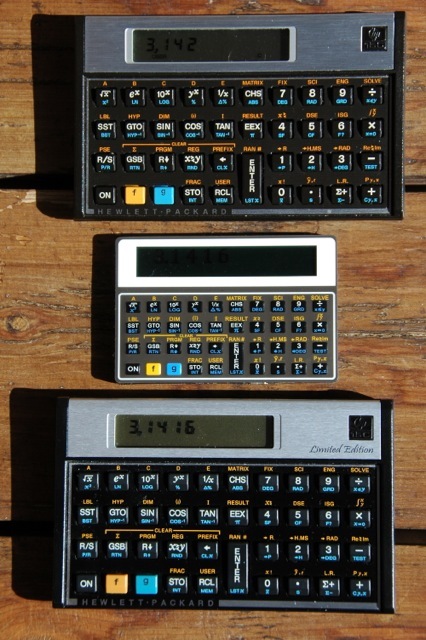
The keyboard has small domes. Of the two units that I have, on one of them all keys register when they click; on the other, some rows require higher presurre to register. The key feel is excellent, while no one would exchange his old HP for this one for the rest of your life.
The colours chosen mimic more the original than the new. The new is all black, while the original had black keys and dark brown for the surface. This clone has a lighter shade of brown than the original but it makes clear what is a key and what's not.
The keyboard will resist grease and dirt. The unit is not water-proof, though: water can come through the sides since it is not sealed. Here there is a picture of the side. Some dust can make it to the screen due to the same fact.
The calculator can be easily opened and cleaned, though. This is clearly a calculator for the Do-it-yourselver.
The version I have is the so-called version 2. There is a third version coming, that will have an aluminium back and better isolation. I will order another - probably in HP16c form. This version comes with a fiber pouch, but sometimes there is a problem with static electricity, whereas the calculator resets. I have read about it in forums and have experienced myself just once. I guess that it has something to do with the screws in the back. It seems that it will be solved with the newer back in version 3. another short term alternative is to use a different pouch or isolate the screws.
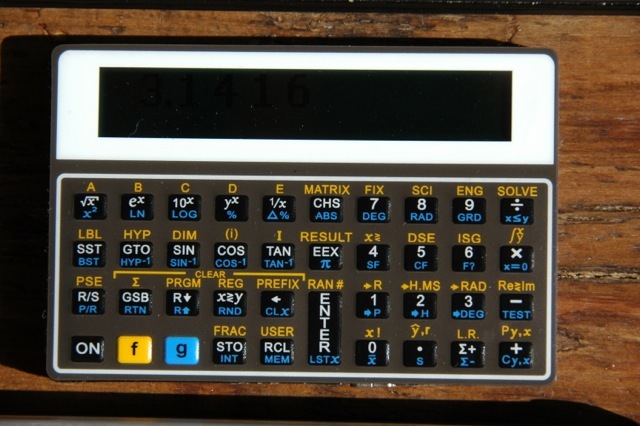
The screen has low visibility under heavy light. This picture was taken on a very sunny floor. but the calculator was switched on, showing "PI". Here below you will see the original on the exact same condition, as well as the LE:
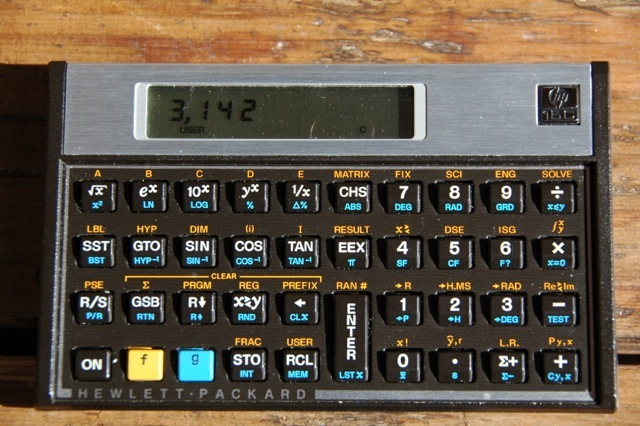
(See the brownish tint to the keyboard surface? Guess you never noticed until you saw the Limited Edition version)
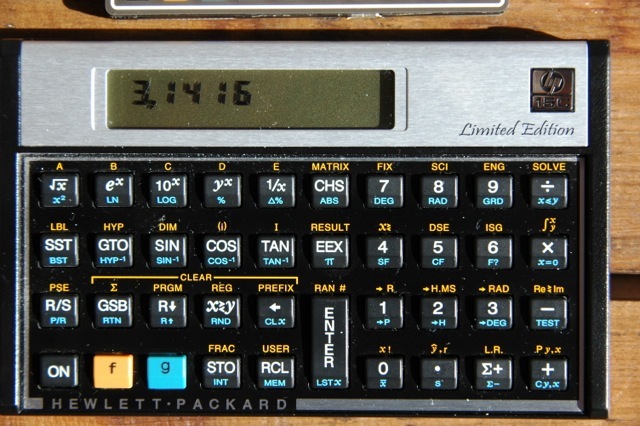
The light conditons make all the more apparent any dust on the surfaces.
The better visibility comes with the original one; second comes the LE and distant third the DM-15cc
On normal conditions, the numbers are much bigger on the DM-15cc. It has two dispay modes: one with rounded digits and another with square ones (mimicking old led displays)
Blog ideas are getting accumulated, and I owe a lot of posts about getting deep into other products. Again, I need to come back to this one. I will put in all my programs and see how it compares with the original, when it comes to real world usability. As well, I will introduce in one of my samples the other firmwares, the ones sporting more memory.
While I started my professional life as a programmer, I am in no way expert on low level programming. I would like to be able to apply the patched firmwares to one of my HP15c LEs and have a supercalculator. I know it can be made, and eventually I will be able to do it - either myself or somebody else.



